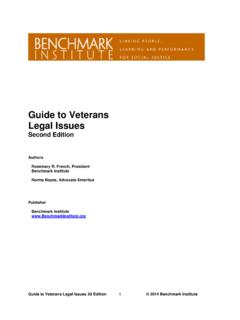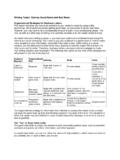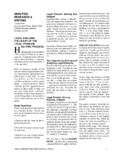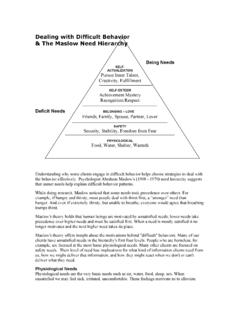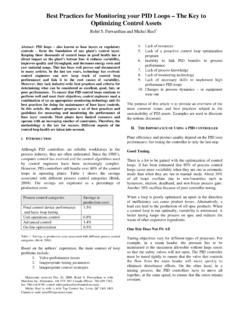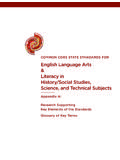Transcription of working with task groups ver 2 - Benchmark Institute
1 working with Task groups working Efficiently with Committees and Teams Teamwork divides the task and multiplies the success. Benchmark Institute 2010. 1. Contents Introduction 3. Considerations in effective work groups 5. group process considerations 8. Tool 1: Task completion timetable 17. Tool 2: Work responsibility 18. Tool 3: Budget form 22. Planning and conducting more effective meetings 23. Meeting assessment scale 25. Meeting management 31. Designing participatory meetings 39. 35 Ways to keep the lid on 5 typical problems 45. What to look for in groups 49.
2 group role behavior 54. Conditions which hinder effective communication 58. Looking at process and participation 64. Suggested readings 72. 2. working with TASK groups . INTRODUCTION. Much of the work of legal services is accomplished through task groups such as committees and teams. As part of your responsibilities, you may find yourself leading these groups for regular staff meetings, organizational discussions, training/updating staff, and case planning. There are many advantages to working in groups , but there are disadvantages as well as almost anyone will tell you.
3 groups are a legitimate and effective way of getting work done, especially if that work is highly complex. In most instances groups produce more ideas, a wider range of options, and more creative approaches than individuals alone. Yet, anyone who has had to coordinate activities and reach decisions with several other people is aware of how frustrating group work can be. There's no doubt that getting work done through groups requires time, effort, and considerable fortitude all of which can be in short supply in temporary task groups such as those most training-responsible staff will experience.
4 Despite the frustrations, we continue to work in groups because we recognize that it takes more than one person's energy, knowledge, skills, and time to get any complex job done at all. Most often, however, groups are not formed and/or managed effectively, thereby failing to take advantage of the greater resources and expertise inherent in a group effort. Meetings, the major vehicle through which group members interact to plan, make decisions and evaluate their work, are frequently poorly planned and managed. They are often a source of frustration, resentment and even anger.
5 How frequently have you thought, expressed or heard the following expressed? "I don't know if I can sit through another two hours of listening to people repeat themselves.". "This committee never gets anywhere. This time I'll take some other work to do while they're rambling on in the meeting.". "I've got more important things to do than sit around in this room and listen to you two fight.". 3. I wish he/she would shut up already so we can get on with our business.". "We never seem to get through our agenda.". "We're not doing anything here that a memo couldn't have taken care of.
6 ". I could have the work completed in the time it took the team to decide what to do.". "You mean I've come all this way and the meeting has been cancelled? Why didn't someone tell me?". Feelings and thoughts like these are clear indications that something is amiss in the planning and leadership of these group meetings. In this manual we aim to improve your understanding of the factors that make task groups effective and your ability to lead the various teams and committees for which you are responsible. But, aside from the obvious benefit of having more productive work groups , why is this important to you and your organization?
7 An effective team or committee is an excellent source of publicity for the training function. Members who experience personal development, achievement and satisfaction through their membership on a team will talk about that experience to others. Thus, you can often build a political support base for your operation through carefully planned and managed task group efforts. 4. CONSIDERATIONS IN EFFECTIVE WORK groups . First, what is an effective task group or team? How do we know when we observe or experience one? Effective work groups can be assessed on three (3) dimensions: productivity, member satisfaction and development.
8 Productivity is the group 's achievement of its goals; member satisfaction refers to how well individuals like working in the group and what they personally derive from their membership in the group ;. development refers to how much opportunity the group offers its members to expand their knowledge and skills. But the assessed effectiveness of the task group on these dimensions will depend upon several factors: a) the group 's size and membership, b) the group 's purpose, goals and task, c) the group 's interpersonal dynamics (process considerations).
9 group SIZE AND MEMBERSHIP. What size should the group be? Who should be a member? What criteria should be used in selecting members--expertise (skills, knowledge, experience), membership in other role groups (job, geographical, race/ethnic, etc.), tradition, special terms of union contract, personal power and influence, Should membership be voluntary, elected, or required? Who decides size and membership of the group ? These are all questions that must be considered when forming a task group . There are really no hard and fast rules to help in these decisions.
10 The criteria will more often than not reflect the values, norms and style of the larger organization. However, it is important to note that a group 's effectiveness is in large measure dependent upon having the appropriate knowledge and skills available to accomplish its work. The following are offered as guidelines when forming a task group : 1. If the group being formed is a) temporary and b) working under considerable time pressure to complete c) dealing with a highly complex task that requires a high degree of interdependence and cooperation; choose people from similar backgrounds who have the requisite knowledge and skills to get the job done and provide strong, positive leadership.

